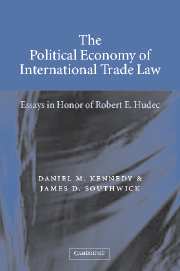Book contents
- Frontmatter
- Contents
- List of contributors
- Preface
- Foreword by E. THOMAS SULLIVAN
- Introduction: An overview of the volume
- Part I The constitutional developments of international trade law
- Part II The scope of international trade law: Adding new subjects and restructuring old ones
- Part III Legal relations between developed and developing countries
- Part IV The operation of the WTO dispute settlement procedure
- 15 Testing international trade law: Empirical studies of GATT/WTO dispute settlement
- 16 The Appellate Body and its contribution to WTO dispute settlement
- 17 A permanent panel body for WTO dispute settlement: Desirable or practical?
- Comment: Step by step to an international trade court
- 18 International trade policy and domestic food safety regulation: The case for substantial deference by the WTO Dispute Settlement Body under the SPS Agreement
- Comment: The case against clarity
- 19 Judicial supremacy, judicial restraint, and the issue of consistency of preferential trade agreements with the WTO: The apple in the picture
- 20 Should the teeth be pulled? An analysis of WTO sanctions
- 21 Problems with the compliance structure of the WTO dispute resolution process
- 22 “Inducing compliance” in WTO dispute settlement
- Bibliography of works by ROBERT E. HUDEC
- Index
20 - Should the teeth be pulled? An analysis of WTO sanctions
Published online by Cambridge University Press: 02 September 2009
- Frontmatter
- Contents
- List of contributors
- Preface
- Foreword by E. THOMAS SULLIVAN
- Introduction: An overview of the volume
- Part I The constitutional developments of international trade law
- Part II The scope of international trade law: Adding new subjects and restructuring old ones
- Part III Legal relations between developed and developing countries
- Part IV The operation of the WTO dispute settlement procedure
- 15 Testing international trade law: Empirical studies of GATT/WTO dispute settlement
- 16 The Appellate Body and its contribution to WTO dispute settlement
- 17 A permanent panel body for WTO dispute settlement: Desirable or practical?
- Comment: Step by step to an international trade court
- 18 International trade policy and domestic food safety regulation: The case for substantial deference by the WTO Dispute Settlement Body under the SPS Agreement
- Comment: The case against clarity
- 19 Judicial supremacy, judicial restraint, and the issue of consistency of preferential trade agreements with the WTO: The apple in the picture
- 20 Should the teeth be pulled? An analysis of WTO sanctions
- 21 Problems with the compliance structure of the WTO dispute resolution process
- 22 “Inducing compliance” in WTO dispute settlement
- Bibliography of works by ROBERT E. HUDEC
- Index
Summary
The most salient feature of the World Trade Organization (WTO) dispute settlement system is the possibility of authorizing a trade sanction against a scofflaw member government. Yet this feature is a mixed blessing. On the one hand, it fortifies WTO rules and promotes respect for them. On the other hand, it undermines the principle of free trade and provokes “sanction-envy” in other international organizations. Undoubtedly, the implanting of “teeth” by the WTO negotiators was one of the key achievements of the Uruguay Round, and a very significant step in the evolution of international economic law. But after six years of experience, WTO observers are beginning to consider whether recourse to damaging trade measures was a good idea. This essay provides an analytical framework for rethinking WTO trade sanctions.
To be sure, the WTO Agreement does not employ the word “sanction.” What the Dispute Settlement Understanding (DSU) of 1994 says in Article 22 is that if a government fails to bring a measure found to be inconsistent with a WTO rule into compliance, it shall enter into negotiations with the government invoking dispute settlement, and if no mutually acceptable compensation is agreed, the plaintiff government may seek authorization from the WTO Dispute Settlement Body (DSB) “to suspend the application to the Member concerned of concessions or other obligations under the covered agreements.” This language is based on a similar provision in the General Agreement on Tariffs and Trade (GATT) of 1947.
- Type
- Chapter
- Information
- The Political Economy of International Trade LawEssays in Honor of Robert E. Hudec, pp. 602 - 635Publisher: Cambridge University PressPrint publication year: 2002
- 7
- Cited by



